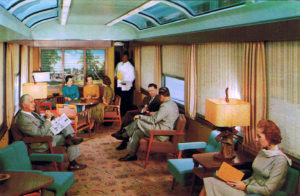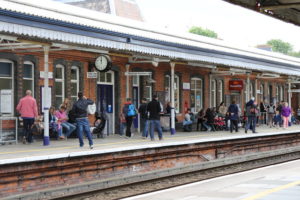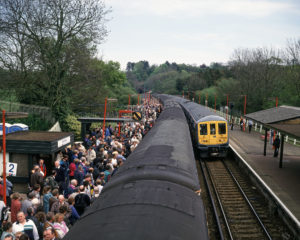07 December 2017
Respect!
Are quiet carriages a thing of the past?
By Lynda Goetz
 At first sight it seems like a fairly trivial issue. Should we still have quiet carriages on trains? Are they really necessary, and if so what exactly are the rules and how should they be policed? It is this latter point which appears to be the trigger for a poll being conducted by South Western Railway as to whether customers want to retain the institution. Part of the problem seems to be the interpretation of ‘quiet’ by some members of the public, and in an increasingly self-centred and ill-mannered age, the idea that those who are disinclined to respect others not only feel free to continue to behave in a way which suits them and inconveniences others, but are prepared to defend their sense of entitlement with aggression.
At first sight it seems like a fairly trivial issue. Should we still have quiet carriages on trains? Are they really necessary, and if so what exactly are the rules and how should they be policed? It is this latter point which appears to be the trigger for a poll being conducted by South Western Railway as to whether customers want to retain the institution. Part of the problem seems to be the interpretation of ‘quiet’ by some members of the public, and in an increasingly self-centred and ill-mannered age, the idea that those who are disinclined to respect others not only feel free to continue to behave in a way which suits them and inconveniences others, but are prepared to defend their sense of entitlement with aggression.
Some train operators dispensed with quiet carriages a few years ago, resulting in a fair amount of media discussion at the time. (The Guardian 2014, The Mail, The Independent, The Guardian 2015) Cross Country got rid of theirs in 2014, and in the same year First Great Western (now Great Western Railway or GWR) converted First Class quiet carriages to standard class, mainly (they claimed) to increase capacity. Now it seems South Western Railway, which services south-west London and southern counties, is conducting an on-line poll. The poll, which is not exactly easy to locate on the website, closes this Friday (8th) and is currently showing 87% in favour of retaining the quiet carriages. The discussions around the subject are nevertheless quite interesting and inter alia throw up once again the question of capacity and First Class carriages.
 I have tried in vain to find out when quiet carriages were first introduced. All indications seem to point to the fact that they probably came in in the early days of mobile phone usage when people seemed to feel it necessary to conduct both their business and domestic lives in the public glare – maybe just to show that they had mobile phones. Before mobile phones, presumably, those travelling with family or friends conducted conversations either discreetly or otherwise depending on their sense of self-importance or desire for privacy. In the early days of rail travel the idea of ‘quiet’ carriages would not have been deemed necessary as people’s behaviour in public places tended much more to respect those around them. Nowadays ‘manners’, which is essentially what this boils down to, seem to be something of which many people are unaware, and yet they are needed more than ever as we are all forced to contend with proximity to complete strangers.
I have tried in vain to find out when quiet carriages were first introduced. All indications seem to point to the fact that they probably came in in the early days of mobile phone usage when people seemed to feel it necessary to conduct both their business and domestic lives in the public glare – maybe just to show that they had mobile phones. Before mobile phones, presumably, those travelling with family or friends conducted conversations either discreetly or otherwise depending on their sense of self-importance or desire for privacy. In the early days of rail travel the idea of ‘quiet’ carriages would not have been deemed necessary as people’s behaviour in public places tended much more to respect those around them. Nowadays ‘manners’, which is essentially what this boils down to, seem to be something of which many people are unaware, and yet they are needed more than ever as we are all forced to contend with proximity to complete strangers.
It is this lack of respect that seemingly first ushered in the need for quiet carriages. They were there so that travellers who found the irritations of other people’s one-sided phone conversations or tinny renderings of music through their earphones distracting and intrusive, could be in a place where such things were unacceptable. Of course, such ‘safe spaces’ were bound to attract the irritable, the cranky and the unsociable, as well as those who simply wanted some peace and quiet. Thus, the inevitable bad-tempered exchanges for which these carriages became known and the claims by rail companies that they were causing rows which they did not have the staff to police. At the time, the abolition of the carriages by Cross Country was hailed as a ‘victory for yobs’ by some readers of the popular press (Daily Mail).
 Whilst I would argue that there is still a place for the quiet carriages, it seems to me that suggesting (as one passenger did back then) that “There are other carriages they (i.e. the yobs) could go to. They should respect that people have booked the quiet coach’, is to take completely the wrong approach. Why on earth should any traveller be subjected to yobbish behaviour?! Just because they have not chosen a quiet carriage, should surely not mean they find selfish, yobbish behaviour in any way acceptable? What is needed is for uncouth, loud, anti-social behaviour anywhere on trains to be unacceptable, and for train staff to have the ability to deal with such behaviour accordingly. If that means a fine or indeed removing them from the train, then so be it. Inspectors certainly seem prepared, as many will have witnessed, to ensure that passengers who have unwittingly (or otherwise) boarded a train for which their ticket is inadmissible are ejected at the next station. Mediation between difficult passengers should be part of staff training. It can self-evidently be the case that those who are asking for quiet are not always charming or reasonable in the way they do so, and modern trains (like modern life) can be stressful. Noisy, badly behaved children, loutish adolescents or adults, fellow passengers who shriek or squeal, eat with their mouths open or noisily use or operate their technology, are all things which happen and can, depending on the sort of mood one is in, be difficult to contend with.
Whilst I would argue that there is still a place for the quiet carriages, it seems to me that suggesting (as one passenger did back then) that “There are other carriages they (i.e. the yobs) could go to. They should respect that people have booked the quiet coach’, is to take completely the wrong approach. Why on earth should any traveller be subjected to yobbish behaviour?! Just because they have not chosen a quiet carriage, should surely not mean they find selfish, yobbish behaviour in any way acceptable? What is needed is for uncouth, loud, anti-social behaviour anywhere on trains to be unacceptable, and for train staff to have the ability to deal with such behaviour accordingly. If that means a fine or indeed removing them from the train, then so be it. Inspectors certainly seem prepared, as many will have witnessed, to ensure that passengers who have unwittingly (or otherwise) boarded a train for which their ticket is inadmissible are ejected at the next station. Mediation between difficult passengers should be part of staff training. It can self-evidently be the case that those who are asking for quiet are not always charming or reasonable in the way they do so, and modern trains (like modern life) can be stressful. Noisy, badly behaved children, loutish adolescents or adults, fellow passengers who shriek or squeal, eat with their mouths open or noisily use or operate their technology, are all things which happen and can, depending on the sort of mood one is in, be difficult to contend with.
 We all owe it to each other to use these confined spaces, where we are crammed in with strangers, respectfully and with social awareness. Any serious transgressions by users can clearly be a matter for the police, but otherwise, in this crowded world of ours, real respect for others in quiet carriages or in any part of the train (indeed in any public space) is not only what we should all be aiming for but what we should generally all be able to expect.
We all owe it to each other to use these confined spaces, where we are crammed in with strangers, respectfully and with social awareness. Any serious transgressions by users can clearly be a matter for the police, but otherwise, in this crowded world of ours, real respect for others in quiet carriages or in any part of the train (indeed in any public space) is not only what we should all be aiming for but what we should generally all be able to expect.
If you enjoyed this post please share it using the buttons above.
Please click here if you would like a weekly email on publication of the ShawSheet

